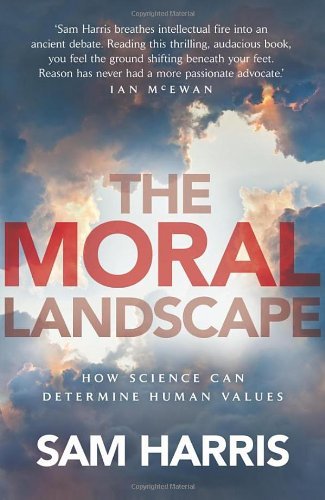 The Moral Landscape, Sam Harris
The Moral Landscape, Sam Harris
I’ve had a good go at reading this without any knee-jerk reactions, but generally I find Harris’ views instinctively abhorrent — despite his championing of reason and science, I don’t think he avoids knee-jerk reactions more than anyone else. Particularly when it comes to religion.
The basis thesis that there are optimal states of well-being for humans, I accept. That science will be able to improve our understanding of that, I don’t doubt. That Sam Harris could be the person that executes this moral calculus? That, I can’t countenance. It’s partly an instinctive dislike — I haven’t enjoyed any of his lectures and talks that I’ve watched either — and partly his intolerance of anything he doesn’t understand.
I mean, he claims to be talking about universal states of well-being, and states that there may be multiple ‘peaks’ on the ‘moral landscape’ where the greatest possible well-being can be achieved. In almost the same breath, he dismisses any thought system he can’t understand, particularly if it involves religion.
Perhaps the fact that I’m a Unitarian Universalist makes this so difficult to swallow. I believe that there are many different paths to follow, whether you’re looking for an afterlife, Enlightenment, reincarnation… There are different ways to be good, and it’s hard to measure that. For example, we would accept a person who works with abused children in Britain, who kept their good as their first priority, as a good person. We would also accept a person who teaches children who are living in poverty in another country as good. Which is better? Which more worthy?
I’m not sure I’m being very coherent about this. I’m sure there’s someone waiting to jump on me telling me that Harris is completely coherent, entirely reasonable, etc; most likely some of them will have some sexist comments to make, without being aware of their own hypocrisy. For me, though, I didn’t find Harris’ argument that coherent. He seemed to argue himself round and round a tiny point without ever looking up to see the wider world and put his work in context — every statement seemed to be a reiteration of his core thesis, rather than something which expanded it.
Rating: 1/5

Definitely not my kind of book. I especially can’t handle opinionated books, even more so when they touch on religion.
I don’t mind too much, but I hate it when people don’t have any respect, you know?
–“He seemed to argue himself round and round a tiny point…”
I’m generally on board with Harris, gen-er-al-ly, but this is exactly the feeling I had reading The Moral Landscape. I think he needed to take a leaf from “Letter to a Christian Nation” and fit a hundred (don’t quote me) solid observations into <100 pages, instead of repeating one observation across three or four hundred. I agree with his position that moral relativism is wrong, but I wouldn't convince anyone by cut&pasting those words over and over again in a comment on someone's blog. Although I should probably try that now:
moral relativism is wrongmoral relativism is wrongmoral relativism is wrongmoral relativism is wrongetcetcetcetc
I have that to read too, somewhere…
Trying to convince me? If so, you’re very unlikely to change my opinion, but I’m not sure if my opinion is quite moral relativism. Rather, I’m positive there are lots of different ways to promote human well being, and no one culture or religion gets it all right, but most have something to offer. People are individuals and different things promote our well-being and cause us suffering. You can’t generalise across the whole spectrum of human experience and say ‘x is always wrong’.
It’s not relative by culture or religion on a big macro level, but on the level of the individual/situation.